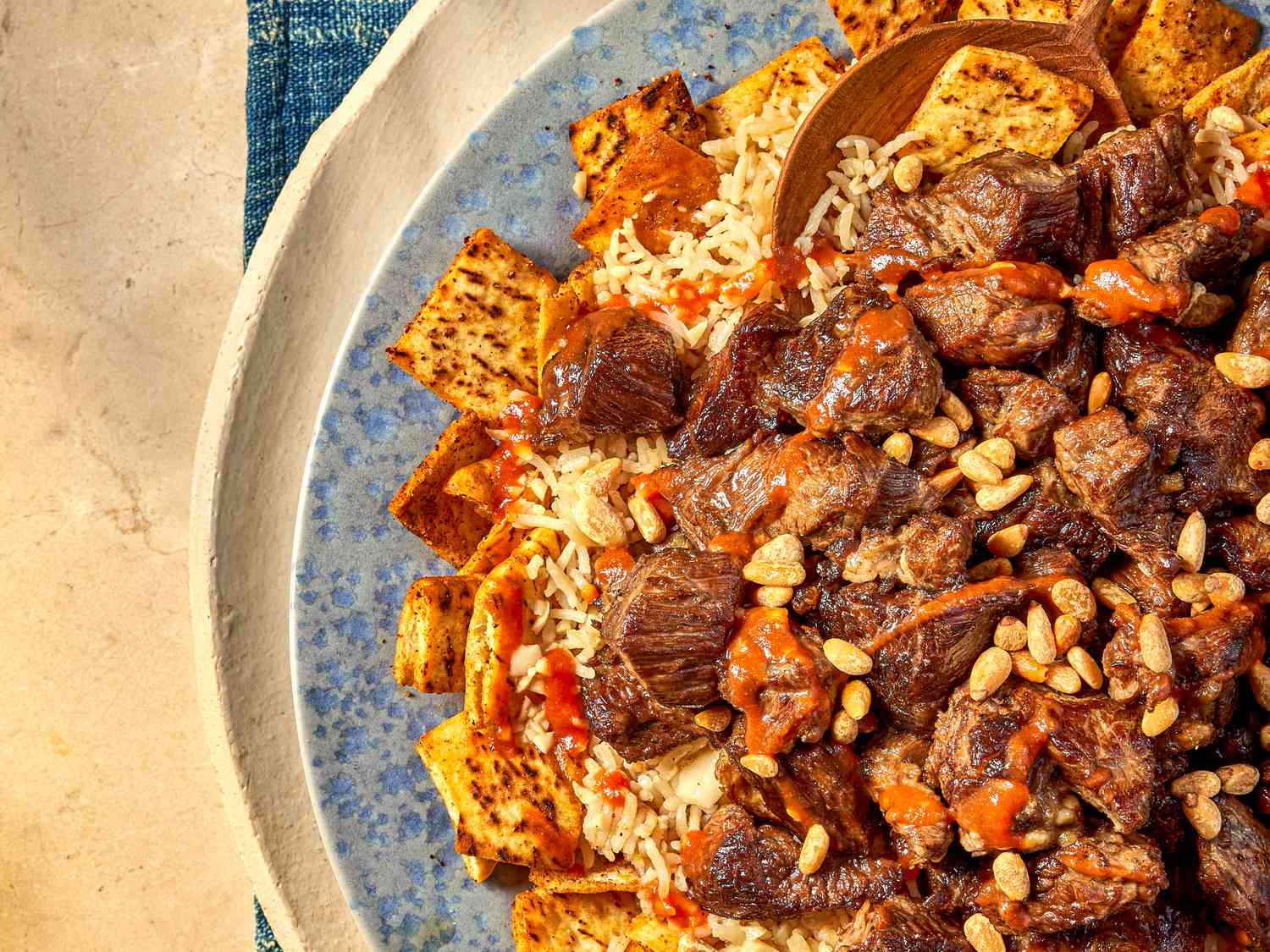Introduction: A Taste of Egypt’s Soul

Culinary Tours in Egypt, Egypt is not only a land of ancient temples, majestic pyramids, and the timeless Nile—it is also a paradise for food lovers. Every region, from the bustling streets of Cairo to the serene shores of the Red Sea, tells its story through flavor. Culinary and food-oriented excursions in Egypt offer travelers a unique way to connect with the country’s history, people, and culture.
Whether savoring Bedouin meals under the desert stars, tasting freshly caught Red Sea fish, exploring street food tours in Cairo, or enjoying authentic cultural dinners in traditional homes, every bite becomes part of an unforgettable journey.
In this blog, we’ll take you on a detailed exploration of Egypt’s most delicious experiences, ideal for anyone seeking not just to see Egypt—but to taste it.
The Rise of Culinary Tourism in Egypt
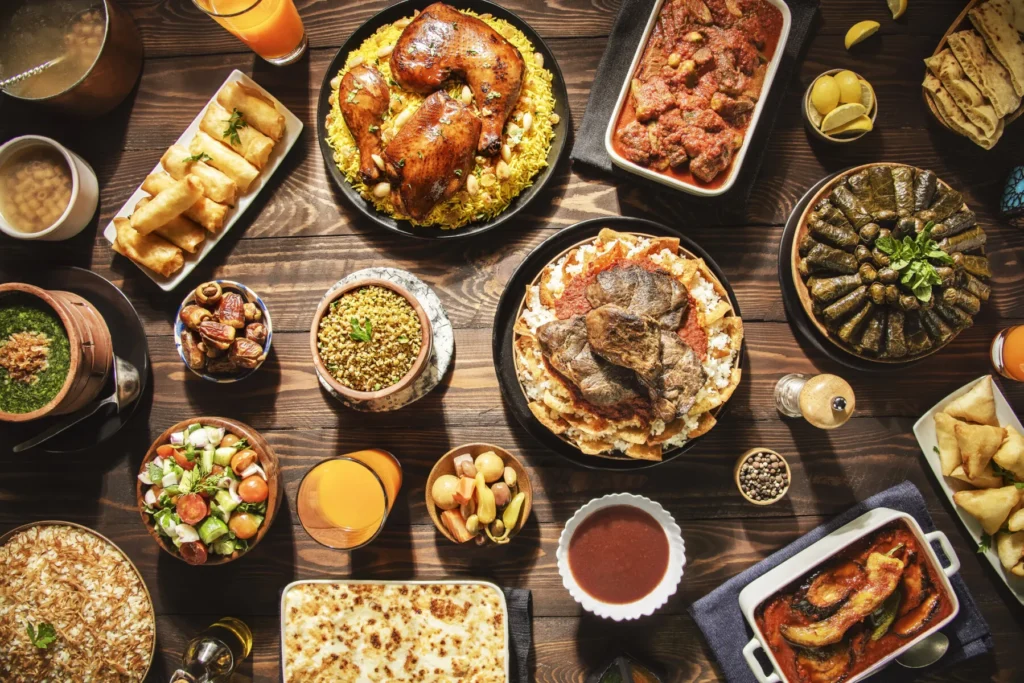
In recent years, Egypt has seen a growing demand for culinary tourism. Travelers are increasingly interested in authentic, local experiences that go beyond sightseeing. A food-oriented excursion in Egypt combines culture, tradition, and sensory pleasure in one package.
From guided market tours to cooking workshops, from tasting tours in Cairo to seafood feasts by the Red Sea, Egypt’s gastronomy reflects the country’s diversity—Arab, Mediterranean, African, and Nubian influences blend seamlessly.
Culinary excursions in Egypt are now an essential part of travel itineraries, offering opportunities to engage with locals, learn cooking traditions, and enjoy dishes that have been passed down for generations.
1. Street Food Tours in Cairo – The Pulse of Egyptian Flavor
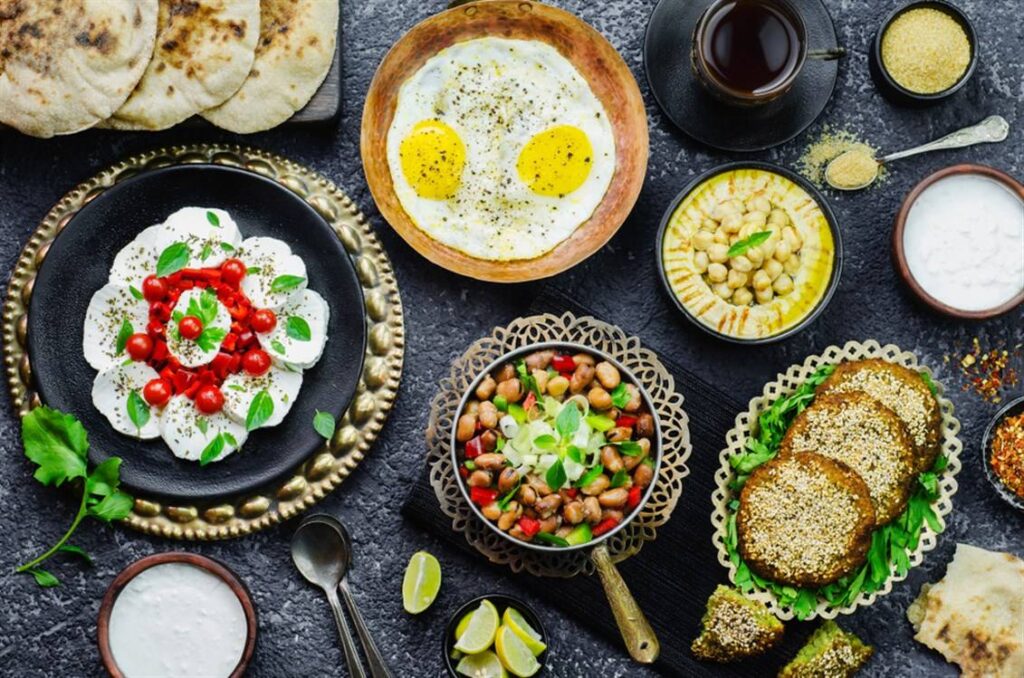
Culinary Tours in Egypt:
No trip to Egypt is complete without exploring the street food culture of Cairo. The capital’s bustling markets, narrow alleys, and lively squares are filled with aromas that capture the essence of everyday Egyptian life.
1.1. What Makes Cairo Street Food Special
Cairo’s street food scene is a melting pot of influences—ancient recipes, modern twists, and a culture of sharing food with friends and strangers alike. Eating on the go is part of the local rhythm, and every corner has something new to offer.
1.2. Must-Try Street Foods in Cairo
- Koshari – The ultimate Egyptian comfort food. A hearty mix of rice, lentils, macaroni, chickpeas, and crispy onions topped with spicy tomato sauce and garlic vinegar. Often called “the national dish of Egypt.”
- Taameya (Egyptian falafel) – Made from fava beans rather than chickpeas, giving it a unique green color and earthy taste. Best enjoyed with fresh bread, salad, and tahini.
- Hawawshi – Spiced minced meat baked inside pita bread, crispy on the outside and juicy within.
- Ful Medames – Slow-cooked fava beans served with olive oil, lemon, and spices. A staple breakfast and street food favorite.
- Fresh juices and sugarcane drinks – Especially refreshing in the Cairo heat.
1.3. Street Food Tours and Experiences
Many travel companies now offer Cairo street food tours led by local guides who explain the history and cultural meaning of each dish. These tours often include visits to old neighborhoods like Khan el-Khalili, Downtown Cairo, and Zamalek, where traditional food stands have been serving the same recipes for decades.
For adventurous eaters, joining a night food tour is a must—when Cairo truly comes alive, and the scent of grilled meats and spices fills the air.
2. Red Sea Culinary Experiences – Fresh Fish and Coastal Flavors
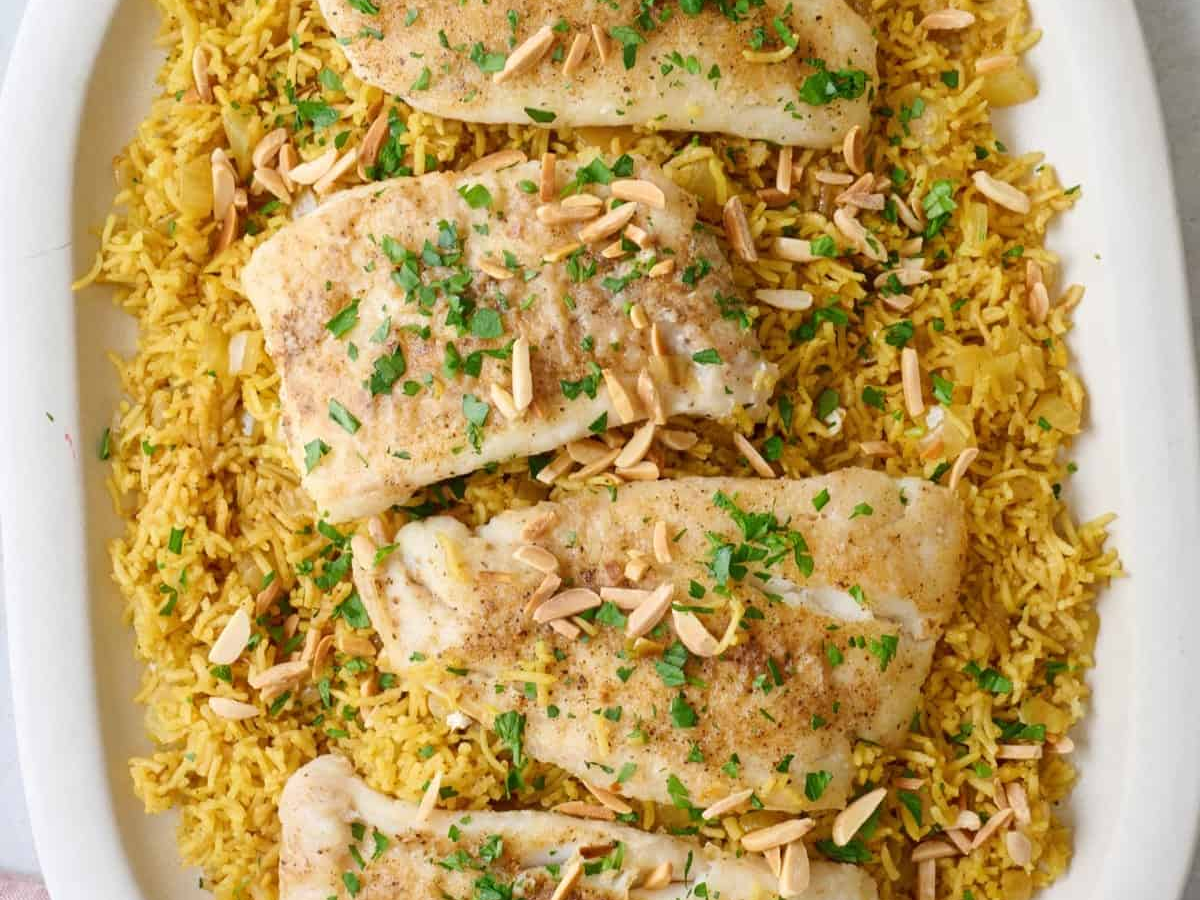
Culinary Tours in Egypt:
For those staying in Hurghada, Marsa Alam, or Sharm El-Sheikh, culinary experiences along the Red Sea offer an entirely different flavor profile. Here, the emphasis is on fresh seafood, simplicity, and natural taste.
2.1. The Taste of the Sea
Local fishermen bring in their catch daily—snapper, grouper, shrimp, calamari, and even lobster. Many resorts and seaside restaurants allow visitors to choose their own fish, which is then grilled or baked to perfection.
Popular dishes along the Red Sea coast include:
- Sayadeya – Fish cooked in a tomato and onion sauce, often served with spiced rice.
- Grilled seabream or snapper – Marinated with garlic, lemon, and herbs.
- Shrimp tajine – Slow-cooked shrimp in a clay pot with vegetables and local spices.
These meals often come with Egyptian-style salads, tahini dips, and warm flatbread.
2.2. Red Sea Food Excursions
Culinary tours on the coast can include:
- Fishing trips with local fishermen, where you catch your own lunch.
- Seafood cooking classes led by Egyptian chefs.
- Boat excursions that combine snorkeling and seafood feasts on deck.
Such experiences are both interactive and authentic—ideal for travelers who want to enjoy the Red Sea not just through its water, but through its taste.
3. Bedouin Meals and Desert Dining – Tradition Under the Stars
Beyond the sea and cities, Egypt’s desert regions offer an entirely different kind of culinary magic. Bedouin meals are not just about food—they are about hospitality, tradition, and simplicity.
3.1. The Spirit of Bedouin Cuisine
In the deserts near Hurghada, Marsa Alam, and Sinai, Bedouin dinners are among the most popular excursions. Visitors are welcomed into Bedouin camps, often after a sunset camel or quad safari, and treated to a meal cooked over open fire.
Typical dishes include:
- Zarb – Meat and vegetables slow-cooked underground, producing tender, smoky flavors.
- Flatbread baked in the sand oven – Freshly made and served warm.
- Grilled lamb or chicken – Seasoned with traditional spices.
- Bedouin tea and coffee – Strong, aromatic, and an essential part of hospitality.
The experience is enhanced by traditional music, stargazing, and storytelling, making it much more than just a dinner—it’s a cultural connection.
3.2. Why Bedouin Meals Are Special
These meals emphasize community and authenticity. Everything is cooked with minimal equipment, using fresh and locally available ingredients. The setting—surrounded by desert silence and illuminated by firelight—creates a truly unforgettable atmosphere.
4. Cultural Dinners and Home-Cooked Experiences
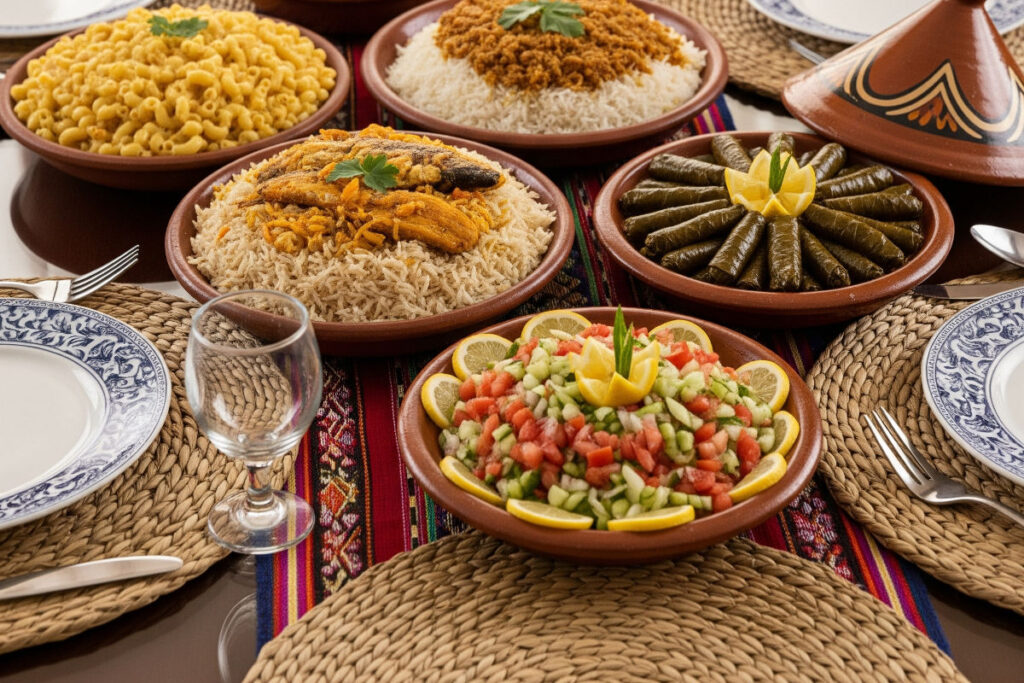
To experience Egyptian cuisine at its most authentic, nothing beats a home-cooked dinner or a cultural evening with locals. In Cairo, Luxor, and Aswan, many families open their homes to visitors, offering traditional meals and sharing stories about Egyptian life.
4.1. What to Expect at a Cultural Dinner
A typical dinner may include:
- Molokhia – A green leafy stew served with rice and chicken.
- Mahshi – Vegetables stuffed with rice and herbs.
- Kofta kebabs – Grilled minced meat skewers served with salad and bread.
- Roz bel laban (rice pudding) – A sweet and creamy Egyptian dessert.
The setting is often intimate—small groups gathered around a shared table, enjoying conversation as much as food. Guests learn about cooking methods, family traditions, and Egyptian hospitality.
4.2. Dinner Cruises and Cultural Shows
In cities like Luxor and Aswan, travelers can also enjoy dinner cruises on the Nile—where gourmet meals are paired with folklore performances, belly dancing, and traditional music.
These cultural dinners in Egypt are perfect for couples, groups, or solo travelers seeking an immersive evening that blends taste, rhythm, and history.
5. Cooking Classes and Market Tours
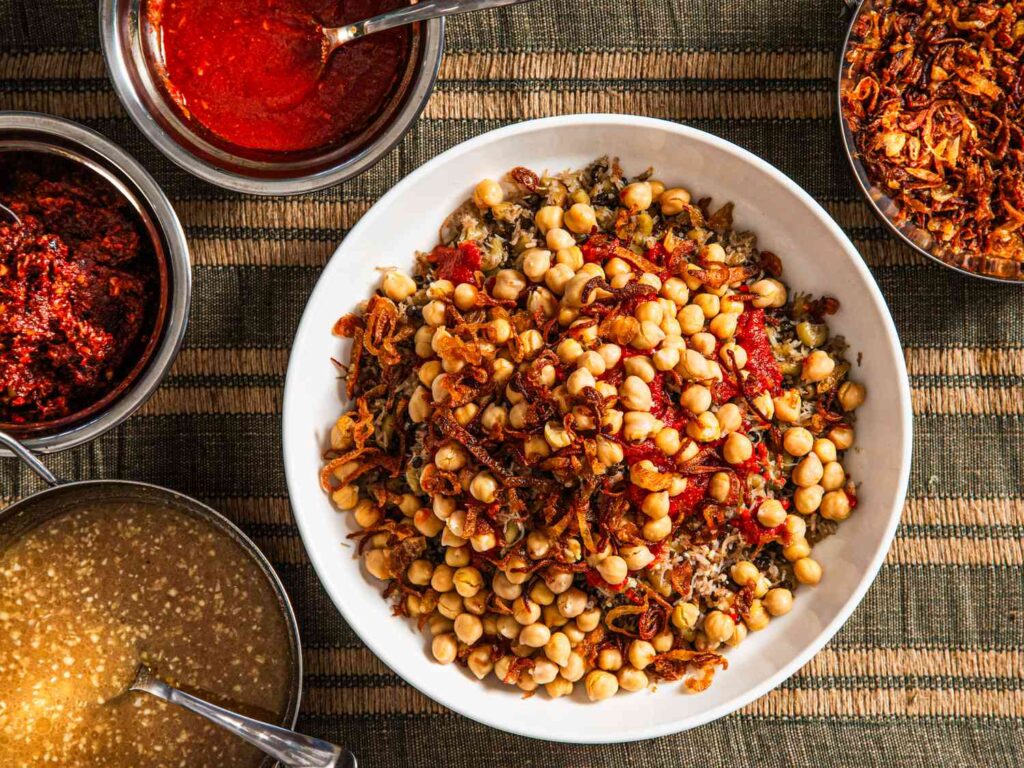
Culinary Tours in Egypt:
A great way to deepen your culinary journey is through cooking classes and market tours. They provide insight into Egyptian ingredients, preparation techniques, and food philosophy.
5.1. Market Tours
Start your day at a local market—like Souq el Ataba in Cairo or Luxor Market—where you’ll explore stalls overflowing with spices, herbs, fruits, and vegetables. Guides explain how locals use these ingredients, and you’ll often have the chance to sample fresh bread or olives directly from the vendor.
5.2. Cooking Workshops
After shopping, the group heads to a kitchen where a local chef or host teaches how to prepare authentic dishes like Koshari, Mahshi, or Fatta.
Cooking classes are available in most tourist cities—Cairo, Luxor, Aswan, Hurghada, and even Sharm El-Sheikh. Many focus on vegetarian or family-friendly recipes, making them ideal for all kinds of travelers.
6. Regional Flavors Across Egypt
Egypt’s culinary map is as diverse as its landscapes. Each region offers distinct ingredients and traditions:
- Cairo: A mix of cosmopolitan and traditional dishes; the heart of Egyptian street food.
- Luxor and Aswan: Known for Nubian influences—spicy stews, lentils, and dates.
- Sinai: Bedouin dishes, grilled meats, and herb-rich recipes.
- Red Sea coast: Fresh seafood with Mediterranean notes.
- Fayoum and the Nile Delta: Rural, hearty meals based on bread, dairy, and legumes.
Exploring these regions through food-oriented excursions in Egypt provides not just culinary joy, but a deeper understanding of the country’s heritage and diversity.
7. The Role of Food in Egyptian Culture
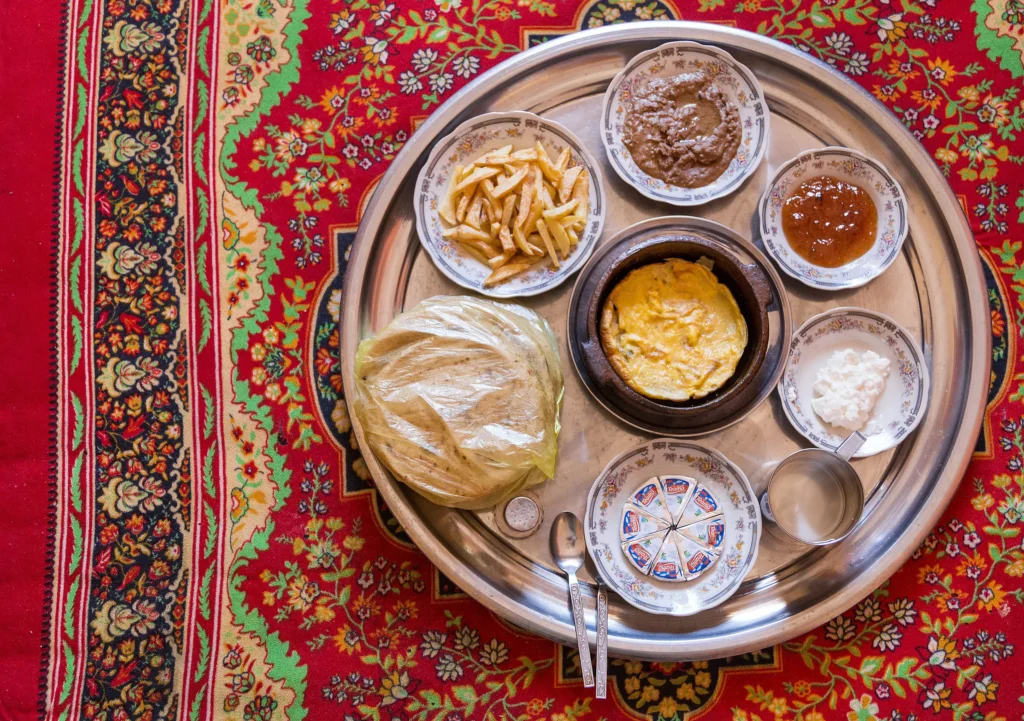
Culinary Tours in Egypt:
In Egypt, food is never just nourishment—it is a symbol of community, hospitality, and celebration.
Meals bring families together, mark religious holidays, and express generosity to guests.
Traditional greetings like “Etafaddal” (“Please join us”) reflect how deeply sharing food is embedded in Egyptian identity. For travelers, this means every meal—whether in a restaurant, a desert camp, or a home—is also an act of connection.
8. How to Choose the Best Culinary Excursion in Egypt

When selecting a food-oriented tour or activity, consider the following:
- Authenticity: Choose experiences led by locals, not commercialized tourist shows.
- Hygiene and quality: Opt for reputable guides and operators, especially for street food tours.
- Variety: Combine different experiences—market visit, cooking, and tasting—to fully immerse yourself.
- Timing: Evening tours are great for street food; mornings are best for markets.
- Small groups: More interaction, better learning, and a personalized atmosphere.
9. Sustainable and Responsible Culinary Tourism
Culinary tourism also carries responsibility. Supporting local eateries, family-run farms, and traditional cooks helps preserve Egypt’s food heritage. Travelers are encouraged to:
- Avoid food waste.
- Respect local customs and modest dining manners.
- Buy from small vendors instead of global chains.
- Appreciate seasonal, locally grown ingredients.
Sustainable travel ensures that Egypt’s food traditions continue to thrive while benefiting local communities.
Conclusion: Tasting Egypt Beyond the Monuments
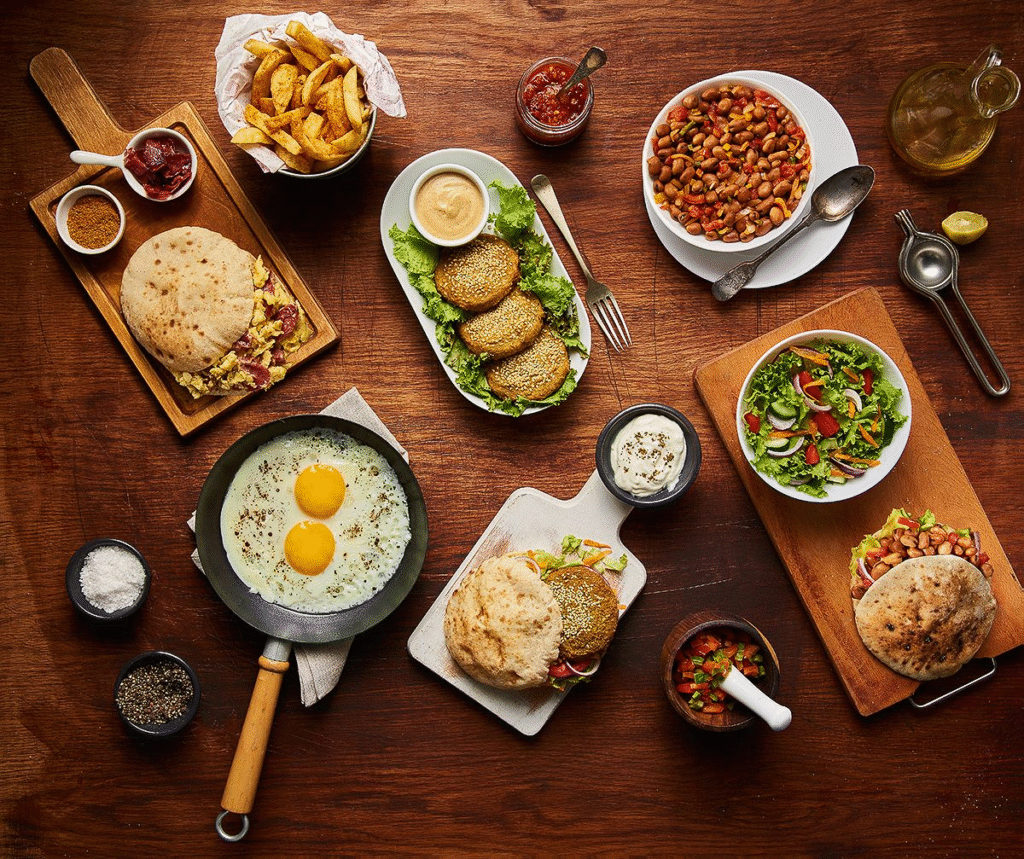
Culinary Tours in Egypt, Food in Egypt is more than a meal—it’s a story of civilizations, families, and landscapes. From Bedouin meals under the stars to seafood dinners by the Red Sea, from Cairo street food tours to cultural home-cooked evenings, every experience offers a new flavor of the country’s soul.
A culinary excursion in Egypt invites you to travel differently—to engage with people, learn traditions, and savor the essence of Egypt one bite at a time. Whether you’re a passionate foodie or a curious traveler, Egypt promises a feast for your senses, filled with color, warmth, and unforgettable taste.

